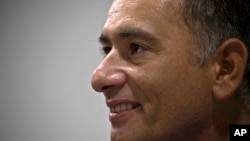New Ebola vaccine and treatment trials are about to begin in West Africa, U.S. officials say.
In roughly two weeks, a study of two vaccines in Liberia will begin enrolling health workers, burial teams and others at high risk of infection, said Anthony Fauci, director of the National Institute of Allergy and Infectious Diseases. About 27,000 people will get one of the vaccines or a placebo.
In about three weeks, doctors in Liberia also will begin testing the experimental drug ZMapp on infected patients.
Several patients received the treatment last year, but because they were not part of a controlled experiment, “it is not possible to determine whether ZMapp actually benefited those patients in whom it was used,” Fauci said in a call with reporters.
Results from the vaccine and ZMapp trials are expected in roughly nine months to a year.
The limited supply of ZMapp ran out quickly last year. It is produced in specially engineered tobacco plants.
Manufacturing has ramped up with assistance from the Biomedical Advanced Research and Development Authority, part of the emergency preparedness and response arm of the U.S. Department of Health and Human Services.
The agency found a handful of other companies in the U.S. to grow more ZMapp.
BARDA Director Robin Robinson said there would be enough medicine available in the short term to treat 50 to 150 people in the drug trial. He expected hundreds of thousands of doses to be available later, should the drug prove effective.
Another production route in mammalian cells is also being explored but needs further testing, Robinson added.
The declining number of Ebola cases in West Africa is good news, but experts point out that the drop makes it harder to test drugs and vaccines.
But Fauci said the treatments may still prove useful in the current outbreak, “particularly in the event of a rebound, as well as in future outbreaks, which historically have shown to be inevitable.”
Also, if it's proved that the vaccines safely boost a recipient’s immune system, that may be enough for U.S. regulators to approve them quickly under rules for special circumstances.




